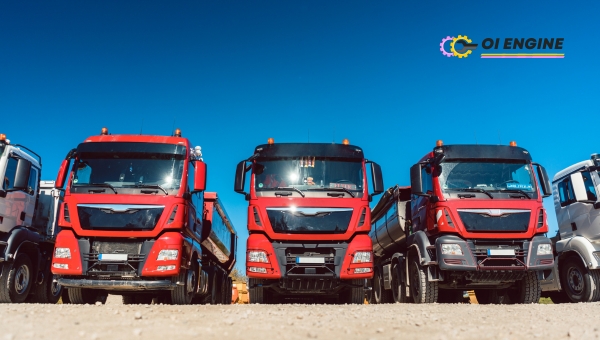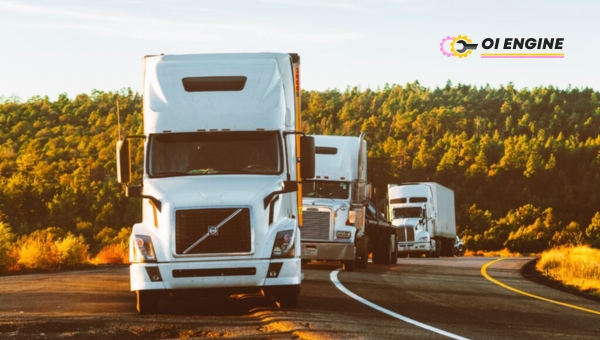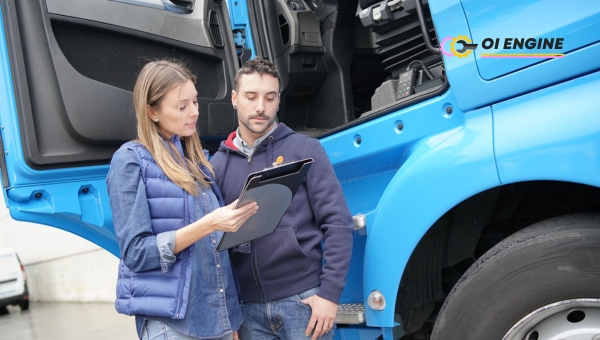Thinking about diving into the trucking business this year? If you’re on the lookout for a guide on how to start a trucking company, you’ve struck gold.
The road to launching your own trucking company could be filled with unexpected turns and junctions. I’m here to offer you a clear, straight path that leads to your very own truck heaven! Are trucks fascinating?
They sure are! But beyond the growl of engines and the allure of the open road, there’s serious business at play. Let’s rev up those engines and set out on this exciting journey together.
Starting your own trucking company involves several most basic steps: researching the market; deciding whether you want an owner-operator model or to act as a motor carrier; choosing your service range; acquiring equipment; complying with regulations; and finding loads.
There’s more—such as ensuring that financial aspects like costs, funding options, and insurance are taken care of. But don’t fret! I’ll walk you through these fundamentals in detail, so even if terms like “motor carrier regulations” seem daunting now, they won’t for long.
Also Useful: 10 Legal Services For Truckers
Preliminary Research & Setting Reasonable Expectations
Before diving in to start a trucking business, I need to do some preliminary research. This way, I can set my expectations correctly regarding the challenges and opportunities that exist.

Let me take you through two crucial steps of this preliminary research: understanding the current market trends and conducting a competitive analysis.
Understanding Trucking Market Trends in 2025
By paying close attention to recent changes and developments within the trucking industry, I can plot a course that’s well-informed and strategic. Some key trends for 2025 include:
- Increasing demand for shipping: As online shopping continues to boom, the shipping industry is growing as well.
- Advancements in technology: From sophisticated GPS systems to self-driving vehicles, these tech upgrades are having a significant effect on how trucking companies operate.
- Environmental regulations: With increasing concern over climate change, new environmental policies may impact how trucking businesses are run.
Considering these trends when starting my outfit will help me craft strategies that position my business advantageously in an evolving marketplace.
Conducting Competitive Analysis
Knowing what I’m up against is necessary before entering any industry – not just trucking. Having in-depth knowledge about my competition can help me understand their strengths and weaknesses which will enable me to find out where there might be room for someone new like myself.
Here’s what I should be looking at:
- Who My Competitors Are: Identifying direct competitors – those offering similar services as mine will give insight into how they manage their businesses.
- Service Offerings: Knowing exactly what services competitors provide helps establish where there might be gaps in the market that could potentially serve as unique selling points for my enterprise.
- Pricing Structures: It’s also helpful if I study how other companies price their services so that mine would have competitive rates.
By conducting a thorough competitive analysis, I can tweak my business model to ensure it stands up against existing competition, yet is unique enough to have its appeal.
Select the Type of Your Trucking Company
Choosing the right business model is the backbone of your trucking company. It’s about how your company operates, makes money, and rises above others.

With two main options, you need to understand each one before making an informed decision. The two models we’re talking about are owner-operator and Motor Carrier.
Deciding Between an Owner Operator model or a Motor Carrier model
Let’s start with the Owner Operator Model. If you want to be behind the wheel yourself, handling your loads and routes, then this is for you.
As an owner-operator, I’d take control of all aspects of my business – from booking loads to driving and maintaining my equipment.
- The freedom is unparalleled; I get to choose who I work with and what jobs I take on.
- I’m less dependent on others for success; it’s largely in my hands.
- Financial gain can be greater as there are fewer people to compensate.
However, being an owner-operator does come with its challenges.
- Starting up may require significant personal investment.
- Juggling administrative tasks with driver responsibilities can be stressful.
- there will always be insecurity regarding steady workloads.
On the other end, we have the Motor Carrier Model, where one manages drivers instead of driving themselves.
As a motor carrier, I’d hire drivers to transport goods while staying off-road focusing on administrative operations like dispatching & coordination.
- There’s potential for more growth as a business owner having multiple trucks running simultaneously.
- Diversified income streams make way for financial flexibility
- Having dedicated personnel for different tasks often leads to improved efficiency
Nevertheless, several downsides exist here too –
- Managing employees means dealing with payroll taxes & additional legal matters
- High upfront costs are needed to start
- The profitability depends upon the ability to keep trucks operational round the clock without mishaps
Over-the-Road vs Regional vs Local
Over-the-road (OTR), regional, or local service types can strongly influence your operations as well as profits.
Over-the-road, or long-haul trucking, involves driving across great distances, often across states or even countries. With this model, I enjoy getting to see new places and getting paid for it! However, it means long hours away from home which can be tough on family life.
Regional trucking means carrying goods within a specific region. For example, you might drive within a radius of 250 miles from your base location. This model offers me shorter routes that still bring good revenue without being so far away from home for an extended period.
Finally comes Local trucking which involves transporting goods within small areas like towns or cities. This allows me to be home every night but these trips generally earn less since they’re shorter distance runs.
To determine what suits you best consider these points:
Pros:
- Over-the-road provides high income due to longer hauls and international opportunities.
- Regional gives a balanced home-to-work life ratio while still earning fairly well.
- Local ensures maximum time at home having less impact on personal life.
Cons:
- In over-the-road, I usually have to spend weeks away from home causing possible strain on personal relationships.
- While driving in the regional range, I found there’s moderate competition which could affect load availability.
- Insertplaceholder With local, businesses might experience lower income due to lesser miles driven per day.
Carrying out thorough research on market trends will help you understand which model is thriving and suits your personal goals and constraints the best.
Equipment & Freight Selection
Now onto one aspect that many find intimidating when starting up – the selection of equipment and freight! Here’s how I approached these:
For Equipment:
- Research: Start by gaining knowledge about different truck types available
- Evaluate: Work out what kind suits your needs best given its size and load capacity.
- Prioritize: Choose reliability over cost whenever feasible because breakdowns can be costly in terms of both money & time.
For Freight:
- Identify Options: Identify different types of freight suitable for transportation via your chosen equipment.
- Assess Demand: Understand which kinds of freight are in demand within your planned service routes.
- Consider Profits: Finally compare the profitability offered by each type, taking into account factors like weight, special storage requirements, etc.
Remember that with growing experience in the business, these selections can evolve. So, choose wisely but stay flexible to change!
How to Create an Effective Business Plan?
Creating an effective business plan doesn’t require any fancy vocabulary or difficult terms – it just needs honest self-evaluation and practicality. Breaking down each part that’s relevant for trucking companies can help:
- Executive Summary: This snapshot of your business includes the company’s name, legal structure (like LLC or corporation), leadership team, and what services it will offer.
- Market Analysis: Understand who you are up against in the market by identifying potential customers, detailing industry outlook and trends, and comparing competitors’ strengths and weaknesses.
- Organization Management: Here you define who will manage what in your organization. Including how many employees might be needed for the various tasks also falls under this section.
- Marketing & Sales Strategy: Determine how will people get to know about your new trucking firm in such competitive times. What strategies do you have in mind to make people choose your services over others? All these fall under this head.
- Service or Product Line: Give details about what kind of transport services or freight delivery options your company plans to offer. You might specialize in moving hazardous materials or frozen foods for instance – whatever it is should be made clear here.
It may seem like a lot at first but creating an effective strategy isn’t hard when we break it down into understandable elements like these! And our goal here is always to make starting a trucking company simple for everyone!
Business Registration & Adherence to Trucking Regulations
Getting the wheels rolling on your start-up trucking company involves anchoring it with the right paperwork. This encompasses both business registration and adherence to all vital trucking regulations.

Navigating this part of your journey may seem complicated, yet these steps are essential in determining how smoothly your operations traverse down the road.
Register Your Trucking Company — Step-by-step guide
Here’s a straightforward guide on how to register your trucking business:
- Identify Your Business Structure: As an entrepreneur, you have to determine whether your business will be a sole proprietorship, partnership, Corporation, or LLC (Limited Liability Company). The structure you choose will determine the extent of personal liability you bear for company debts and decisions.
- Choose a Name: Picking out a name for your enterprise can be exciting! Ensure that it is unique and aligns with what you envision for your brand.
- Register Your Business: This step requires filing necessary documents with state authorities where you intend to do business. The registration process varies by state, so make sure to follow specific procedures followed in yours.
- Obtain Federal and State Tax IDs: These numbers are like social security numbers for businesses—they allow government agencies to track revenues and ensure compliance with tax laws.
- Procure Necessary Licenses & Permits: Licenses like USDOT Number, Motor Carrier Authority (MC Number), BOC-3 filing, etc are crucial in operating a legitimate trucking company.
These instructions should help most aspiring entrepreneurs get started on their quest into How to Start a Trucking Company.
Every journey is unique, so always seek professional advice tailored exclusively to yours! Ensure each step taken follows legal pathways because this guarantees protection from any administrative hassles that might crop up later on the road.
Understand the regulations specific to Motor Carriers
As part of learning how to start a trucking company under the motor carrier model, it is crucial to dive into specifics about the rules in this particular segment of the industry. For starters,
- You need to comply with driver qualification laws laid out by the Federal Motor Carrier Safety Administration (FMCSA). This includes a physical fitness test, drug screening, and background checks for all drivers.
- Operational safety guidelines enforced by FMCSA also must be strictly followed. These comprise hours-of-service laws defining permissible on-duty time limits and mandatory break periods.
- Regularly maintaining accurate records such as driving logs, vehicle inspection documentation, and repair/maintenance receipts is obligatory.
Remember, these are suggestions rather than an exhaustive list of obligations for motor carriers.
General trucking Regulations affecting both motor carriers and owner-operators
Even though there are specifics for each type of trucking operation model, some mandatory industry-wide regulations apply across the board that you should familiarize yourself with:
- Irrespective of your business model each registered commercial vehicle exceeding 10,001 pounds Gross Vehicle Weight Rating (GVWR) must comply with DOT numbers issued by the Department Of Transportation.
- A clean driving record is non-negotiable in the industry. Both types need drivers with Commercial Drivers Licenses (CDLs), no traffic violations or DUI charges.
- The transportation safety norms laid down by the Occupational Safety Health Administration (OSHA) zone on employee protection guidelines which include safety training, equipment, and hazard protocols.
Straying from these industry-wide regulations could result in hefty fines or even revoking of your operating authority.
The distinction between the two main business models and stringent compliance with trucking regulations is an absolute necessity for a newcomer in the industry. Following these guidelines will ensure that the ‘getting on the road’ part of starting your trucking company unfolds seamlessly.
Also Related: GPS For Truckers 2025: Unveil Top Navigation Picks!
Financial Planning for Your New Business
Starting up a new business like a trucking company requires careful financial planning. This is your foundation, and it’ll directly impact other areas of your venture such as operation and growth.

Now, let’s dive into the core financial aspects you need to consider while starting a trucking company: cost setup, funding options, and basic operational costs.
How Much Does it Cost to Start a Trucking Company?
When you plan to start a trucking company, remember this: every penny counts. You need to have an explicit breakdown of all the initial costs involved in setting up your business.
The first step is obtaining a commercial driver’s license (CDL), which may cost between $4,000 and $12,000 depending on the training school.
Next comes the primary expenditure – buying or leasing trucks and trailers. A new semi-truck could range from between $70,000 and $150,000 while used ones might be available between $40,000-$111,000 based on their age and condition. Remember that equipment maintenance should also be included in your budget.
You’ll also need office spaces either owned or rented for dispatchers and the bookkeeping department. There are necessary permits/licenses ($500-$700) & heavy vehicle use tax ($100-$550 per year). Always keep aside some funds for emergencies as well.
Start-up Funding Options
Since we’re discussing expenses involved in starting our trucking business – the next question is “Where will this money come from?” Well! Here we have several options.
You can use personal savings if available or opt for bank loans with calculable interest rates, but ensure your credit score doesn’t sink under the weight of hefty repayments.
If you’re hesitant about formal institutions you might consider private lenders but bear in mind they often charge higher interests compared to banks.
Interestingly enough crowdfunding platforms are gaining popularity these days where you present your business idea publically and like-minded individuals or groups contribute financially in exchange for some kind of return.
What Equipment do You need to Start a Trucking Company?
When we talk about equipment, it’s not just about trucks. Your trucking company will need various types of machinery depending on the kind of freight you plan to carry.
Besides, understanding the average cost for each type will help in budgeting for these necessary assets.
- Semi-Trucks: These are integral parts of a trucking company. The average cost varies greatly depending on whether you’re purchasing new or used ones, their sizes, and capacities. On average though, new semi-trucks can range between $70,000 and $150,000.
- Trailers: The type you’ll purchase depends largely on your freight style preference—whether it’s flatbeds or enclosed trailers—each having its pros and cons relating to what materials they best transport. Average costs for new trailers range between $12,000 – $40,000.
- Forklifts: They are necessary if your business deals with Warehousing or sorts loads before transportation. Costs can range from as low as $20000 to $45,000.
Remember that these prices vary widely based on different factors such as brand and model chosen; hence a thorough market comparison is advisable before making any procurement decision.
Choosing what equipment one needs also requires considering aspects like maintenance costs (which include parts replacement), fuel economy which directly impacts operational expenses, etc., so all these factors should be considered when planning out how much equipment will cost.
What are the Different Business Insurance available?
When learning how to start a trucking company, it’s crucial to understand that business insurance is no less essential than any other aspect of your preparation.

Just like physical gear or digital software supports your company’s operations, insurance coverage safeguards your business against different kinds of potential harm and liabilities.
Each type has its special features, but all share the common goal – protecting your company from unforeseen circumstances.
Why is Motor Carrier Insurance an Integral Part of Your Plan?
Motor Carrier Insurance happens to be a key element while drafting an operational plan for a trucking company starting afresh. It’s not just important because it’s required by law but also because of the security that it provides.
- Economic Protection: One significant benefit is financial coverage in case you meet with an unfortunate incident like an accident when on the road. It can take care of costs involving vehicle repair and replacement, medical expenses arising out of injuries suffered in the accident, or even legal issues.
- Legal Compliance: As per federal and state laws, all motor carriers are supposed to have certain insurance requirements fulfilled. This legal stipulation ensures public safety as well as economic protection for all parties involved in the transportation process.
- Peace of Mind: Lastly, being covered by reliable insurance gives peace of mind which enhances productivity and smooth business operation because you know that there’s a safety net readily available to absorb shocks from unforeseen incidents.
Having Motor Carrier Insurance integrated into your planning process shields you from potential losses while keeping you legally compliant—that’s how crucial this can be.
Owner Operator Insurance
Another very significant type of business insurance when learning how to start a trucking company would be Owner Operator Insurance. This specific type carries its own set of benefits:
- Personal Coverage: While motor carrier covers anything related directly to professional duties performed by their employed drivers, owner operator helps protect against accidents or damages that occur when the truck is off-duty. This eventually assures full-round coverage.
- Non-Trucking Liability: Also known as “bobtail insurance,” this cover kicks into action while your truck is without any goods or consignment and gets involved in incidents causing injury or damage to other vehicles.
- Physical Damage Coverage: This compensates for any sort of physical damage to the owner-operator’s vehicle, arising from collision or other disasters like fire, theft, etc., irrespective of whether your vehicle was on a consignment haul at that time or not.
- Occupational Accident Insurance: It can step in when medical issues are caused by accidents that happened during job hours and generally includes benefits for medical expenses, disability benefits, and accidental death benefits.
From personal covers to liability protection, Owner Operator Insurance offers a comprehensive set of facilities specially designed to suit individualistic needs for security and protection.
Finding Loads & Optimizing Your Business
Once your trucking company is up and running, there are two key things to focus on for sustained growth: finding loads and optimizing your operations.
Securing reliable loads ensures that your trucks aren’t sitting idle, costing you money. Meanwhile, continuously optimizing your business helps in boosting efficiency and minimizing expenses. Let’s delve into these two aspects.
The Right Way to Find Loads in 2025
In today’s wired world, the conventional way of manually looking for haulage jobs isn’t as effective. Instead, let’s look at modern methods used widely by successful truck businesses:
- Online Load Boards: These are platforms where shippers post their freight that needs hauling. They’re like job boards but specifically for the trucking industry. It’s simple to use – I just sign up and search for suitable loads based on my fleet capability and location preference.
- Freight Brokers: Just like real estate brokers help people buy or sell homes, freight brokers help connect truckers with shippers who have goods that need moving. While brokers would take a commission out of each deal sealed they can help me get access to reputable clients and negotiate better rates.
- Direct Shippers: Establishing direct relationships with businesses or factories can give me consistent workloads while reducing dependence on middlemen resulting in more profit.
Business Optimization Tips for Your Trucking Company in 2025
Every thriving business continually looks at ways to reduce costs and increase productivity – my trucking company should do the same! Here are some easy tips I can apply:
- Adopt Technology: Consider investing in automation software to manage dispatches more efficiently or GPS-enabled systems that provide real-time tracking of trucks which improves route optimization.
- Regular Maintenance: Keeping my trucks well-maintained may seem an unnecessary cost initially but it avoids unexpected breakdowns saving considerable expenses down the line.
- Effective Fuel Management: Constantly monitoring fuel consumption can help me identify patterns and make adjustments leading to potential savings. Also, fuel cards with reward programs can further offset these costs.
- Accurate Bookkeeping: By diligently tracking all expenditures, I gain better insight into where my money is going, thereby allowing me to make data-based decisions to trim unnecessary costs.
Remember that the key is consistent action on these tips. A little progress every day will eventually culminate in a strong and profitable business.
Also Check: Trucking Magazines: Discover The 20 Best Industry Reads!
FAQs
How profitable is starting a trucking company?
Starting a trucking company can be lucrative if managed well. The profitability hinges on several factors like business model, service range, load optimization, and adherence to industry regulations.
Is it difficult to start a trucking business?
Beginning any business comes with its challenges and the trucking industry is no different. However, with sufficient planning, understanding of market trends, apt financial planning, and regulatory compliance, it can be simplified.
How many trucks do you need to start a trucking company?
There isn’t an absolute number. It depends on your chosen model – owner-operator or Motor Carrier. For the former, you might start with just one or two trucks but for later you would certainly need more.
How much capital is needed to start a trucking company?
The capital required varies widely based on aspects like the type of trucks needed, insurance coverage operating expenses, etc. An in-depth cost analysis should provide a clearer picture.
Do truck owners make money?
Yes, as long as they’re effectively managing operational costs and securing sufficient loads for their trucks. Efficiency of routes driven and negotiation of rates also significantly affect earnings.
Conclusion
Knowing how to start a trucking company requires extensive research, planning, capital investment, and a deep understanding of the industry.
Your journey will involve examining market trends and making strategic decisions about your business model and range of services.
It also means crafting an effective business plan and adhering to regulations within the trucking industry. Financing your venture is a crucial step as it involves identifying costs and sourcing funding options for making this dream come true.
Equipping your business with the right tools and getting insured is necessary too. Lastly, you’ll be on the search for loads while seeking ways to optimize your operations for maximum profitability.
